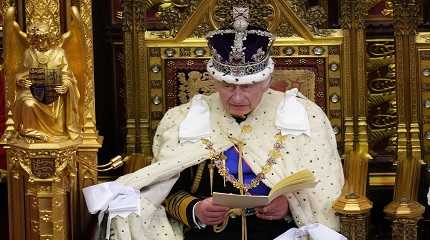
LONDON (AP) — Britain’s Conservative government set out a pre-election policy slate including tougher sentences for serious crimes and promises of elusive economic growth on Tuesday in a speech delivered by King Charles III at the grand State Opening of Parliament.
The king read out a speech written by Prime Minister Rishi Sunak’s government, outlining its legislative plans for the next year. The government said it was making “difficult but necessary long-term decisions to change this country for the better.” Opposition politicians and business groups called it a lightweight speech short on measures to kickstart a sluggish economy.
It’s almost certainly the last such speech before a national election, and Sunak’s first chance to set out major legislative plans since he became prime minister just over a year ago. The last session of Parliament opened in May 2022, when Boris Johnson was prime minister and Queen Elizabeth II sat on the throne.
Charles became monarch when his mother died in September 2022 after a 70-year reign. He paid tribute to “my beloved mother” at the start of the first King’s — rather than Queen’s — Speech since 1951.
The speech gave clues to how the Conservatives plan to campaign in an election that must be called by the end of 2024. The Tories have been in power since 2010, but opinion polls put them up to 20 points behind the opposition Labour Party.
There was a strong focus on law and order, an area where the Conservatives think they have an edge over left-of-center Labour. The speech announced tougher sentences for serious offenses, including no-parole “life means life” sentences for people convicted of sadistic murders and an end to early release for serious sexual offenders.
The speech, which lasted just over 10 minutes, set out a modest slate of 21 bills, ranging from changes to the way soccer teams are run to a clampdown on unlicensed pedicabs.
Several laws were touted as “Brexit freedoms” enabled by the U.K.'s exit from the European Union, including less stringent data-protection rules to replace the EU’s GDPR, and a ban on exporting live animals for slaughter.
The government also announced plans to continue the watering-down of environmental measures started by Sunak when he lifted a moratorium on North Sea oil and gas extraction in July. A planned law will require new oil and gas drilling licenses in the North Sea to be awarded every year. The government argues that will protect jobs, cut Britain’s reliance on foreign fuel and increase energy security.
Environmentalists and opposition parties say it will just make it harder for the U.K. to switch to renewable energy and to meet its goal of reducing U.K. greenhouse gas emissions to net zero by 2050.
“The lack of legislation to match the efforts of the EU and U.S.A. on green industrial strategy is a huge backwards step,” said George Dibb of left-leaning think tank the Institute for Public Policy Research.
The king, a lifelong champion of green causes, gave no flicker of emotion as he announced the plan for more oil drilling. Monarchs are constitutionally obliged to follow the government’s advice, and Charles is barred from expressing his view on the measures he read out on behalf of “my government.”
Detailed economic plans were scant, though the speech included legislation aimed at developing, and regulating, sectors such as AI and self-driving cars, and a law to open Britain’s market to Pacific Rim nations as part of a trade agreement, known as the CPTPP, that the U.K. joined this year.
Treasury chief Jeremy Hunt is due to give more economic details in an autumn budget statement on Nov. 22.
“The King’s Speech opened with an aspiration to increase economic growth – but it failed to outline how that will happen,” said Alex Veitch, director of policy and insight at the British Chambers of Commerce.
There also was legislation to enact Sunak’s plan to stop new generations from smoking by gradually raising the minimum age for buying tobacco, so that no one turning 14 this year can ever legally be sold cigarettes.
Several bills were carried over from the last session, including a contentious plan to ban public bodies from imposing “politically motivated boycotts of foreign countries” – a law aimed at stopping boycotts of Israel.
Several past promises were delayed or jettisoned, including a long-pledged ban on so-called “conversion therapy” that seeks to change a person’s sexual orientation or gender identity. Gay-rights charity Stonewall called that “an abject failure to protect for the most vulnerable members of the LGBTQ+ community.”
The King’s Speech was the centerpiece of a parliamentary opening ceremony that reflects the two sides of Britain’s constitutional monarchy: royal pomp and political power.
The day began with scarlet-clad yeomen of the guard searching Parliament’s cellars for explosives, a reference to the 1605 Gunpowder Plot in which Roman Catholic rebels led by Guy Fawkes tried to blow up the building with the Protestant King James I inside.
The king traveled from Buckingham Palace in a gilded horse-drawn carriage, past a few dozen anti-monarchy protesters holding signs reading “Not my king.” He read the speech from a golden throne, wearing the Robe of State and the Imperial State Crown, encrusted with almost 3,000 diamonds.
Hundreds of lawmakers and red-robed members of the House of Lords packed Parliament’s unelected upper chamber for the speech. Monarchs have been barred from entering the House of Commons since King Charles I tried to arrest lawmakers there in 1642 – an act of royal overreach that led to civil war and the monarchy’s temporary overthrow.




